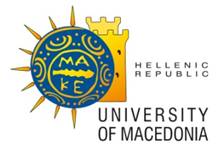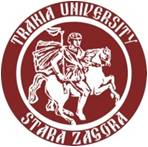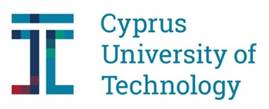
The University of Macedonia is the second and “youngest” University of the city of Thessaloniki and it specializes in economic and social sciences. It was founded by the Greek State under the Presidential Decree 147/10-4-1990. In the past it was widely known as Graduate School of Industrial Studies of Thessaloniki which was founded in 1948 and started its first operation during the academic year 1957-1958. In the academic year 2016-2017 the University of Macedonia completed 60 years of operation as an Institution of Higher Education in Greece.
Today, more than 12.000 students study at the University of Macedonia in economic, administration, social and political related fields. Our primary consideration is the maintenance of high standards in terms of the University’s operation. The high level of graduates and professors and their participation in the shaping of new knowledge with publications of international standing, the innovative teaching methods, the modern equipment and the qualified administrative staff constitute the factors which define the university’s quality. By developing new and updating the existing Undergraduate Study Programs, organizing high-standard Postgraduate Programs and giving emphasis on scientific research, the University of Macedonia aspires to become one of the leading Higher Education Institutions in its fields of specialization in the Balkan Peninsula and Europe. The University also aims at responding to the needs of society, working together with public organizations and private businesses, shaping partnerships with other Universities and Research Centers in ways that complement and enhance its activities. Through its diverse initiatives and events, the University also contributes to the cultural affairs of Thessaloniki and Macedonia by maintaining a continuous interaction with citizens.
 Trakia University (TRU) is an autonomous state educational and scientific institution based in the town of Stara Zagora, Bulgaria. It was established by a Decision of the National Assembly of July 21, 1995 on the grounds of Art. 53, par. 5 and Art. 86, par. 1 of the Constitution of the Republic of Bulgaria and Art. 2, par. 1 of the Higher Education law (HEL) on the basis of the Higher Institute of Zootechnics and Veterinary Medicine and the Higher Medical Institute -Stara Zagora, with their existing faculties and independent units. According to the Council of Ministers decree № 125 / 24.06.2002, Trakia University covers 6 of the fields of higher education / pedagogical, social and economic, natural, technical, agricultural sciences and veterinary medicine, healthcare and sports /, as well as 16 professional fields from the Classifier of areas of higher education and professional fields. Trakia University is one of the first accredited universities to receive regular institutional accreditation with a grade of “very good” from the National Evaluation and Accreditation Agency (NEAA) with Protocol № 30 / 18.03.1999 for a period of 5 years with the right to teach in the educational and scientific degree “Doctor” / Letter of NEAA with ref. № 137 / 19.03.1999.
Trakia University (TRU) is an autonomous state educational and scientific institution based in the town of Stara Zagora, Bulgaria. It was established by a Decision of the National Assembly of July 21, 1995 on the grounds of Art. 53, par. 5 and Art. 86, par. 1 of the Constitution of the Republic of Bulgaria and Art. 2, par. 1 of the Higher Education law (HEL) on the basis of the Higher Institute of Zootechnics and Veterinary Medicine and the Higher Medical Institute -Stara Zagora, with their existing faculties and independent units. According to the Council of Ministers decree № 125 / 24.06.2002, Trakia University covers 6 of the fields of higher education / pedagogical, social and economic, natural, technical, agricultural sciences and veterinary medicine, healthcare and sports /, as well as 16 professional fields from the Classifier of areas of higher education and professional fields. Trakia University is one of the first accredited universities to receive regular institutional accreditation with a grade of “very good” from the National Evaluation and Accreditation Agency (NEAA) with Protocol № 30 / 18.03.1999 for a period of 5 years with the right to teach in the educational and scientific degree “Doctor” / Letter of NEAA with ref. № 137 / 19.03.1999.
Trakia University provides high quality higher education for professional careers in the field of human and veterinary medicine, pedagogy, engineering and technology, agriculture, economics, ecology and environmental protection, in order to professionally and personally develop the specialists necessary for the economic and spiritual prosperity of country and region. The mission determines the educational policy of the University, focused on the needs of the society on a regional and national scale. For its implementation, Trakia University is guided by strategic guidelines, towards which it orients its overall activity.

“St Kliment Ohridski” University – Bitola. The preserved values of the rich cultural history and their existence as an eternal inheritance of our predecessors, as values embedded in Macedonian insubordination through turbulent historical events, remain to be a constant challenge for the present and the future. They are represented trough long -time aspiration of our people for its own assertion and competition with all cultural nations whose development bottom line is the civilized humanism. The foundation of the second Macedonian University and its 30 years long development represents an important circle in the chain of achievements in the educational, scientific and cultural architecture in the contemporary Macedonian society. The act of the formal establishment of the “St Kliment Ohridski” University – Bitola, on the 25th April 1979 is result of a longer process, during which the historical tradition is the initial basis for the further cultural and scientific progress.
Today, the developing concept of the “St Kliment Ohridski” University – Bitola (UKLO) clearly and undoubtedly confirms its significance as an autonomous higher education and scientific institution, determined to orient its further development towards the mutual European Higher Education Area (EHEA).
The University’s mission is to create integrated university with provided quality in all segments of its functioning, thus having recognizable values in the higher education area in Republic of Macedonia, placing the student in the focus of the university functioning. The realization of the mission, more than ever, imposes mobilization of the existing professional staff and other potential, which, through the forms of the university functioning and the bodies and organs of the University, as well as trough the everyday commitments, will create conditions for successful development.

The Cyprus University of Technology‘s vision is to become a modern and innovative university with international recognition which promotes excellence in education and research in cutting-edge fields, aiming at the scientific, technological, economic, social and cultural upgrading of our country. CUT’s mission is to provide high-quality education and high-level training and to promote lifelong learning with modern pedagogical methods, to produce and disseminate scientific knowledge through research and teaching, and through contribution towards addressing challenges in the fields of Science and Technology, to become a catalyst for the state and society. In particular, the mission focuses on creating added value through actions on the following three axes:
- Education
- Research, Innovation and Transfer of Know-how
- Social contribution
 The Federation of Industries of Greece (SBE) was established in 1915. Since its foundation, it has been active in its efforts to promote not only industrial development, but also economic and social progress in Greece. It proposes and contributes to actions aimed at establishing and promoting the competitive advantages of Greece, as well as to the promotion of the overall economic development of the region.
The Federation of Industries of Greece (SBE) was established in 1915. Since its foundation, it has been active in its efforts to promote not only industrial development, but also economic and social progress in Greece. It proposes and contributes to actions aimed at establishing and promoting the competitive advantages of Greece, as well as to the promotion of the overall economic development of the region.
The main aims of SBE’s development strategy have, for many years, been based on overall regional growth and development, as well as on the industrial development and international competitiveness of Greek industries, and on Balkan and Black Sea economic co-operative ventures.
Over the years, SBE has worked ceaselessly to achieve these goals and will continue its efforts to maximize and channel the benefits of these activities not only towards industrial development but, on a more general level, towards the economic and social progress of Greece. Members of the Federation are manufacturing companies and industrial organisations.
 Bulgarian Industrial Association – Union of the Bulgarian Business (BIA) is a non-governmental organization, established on April 25, 1980. In its 40-year history, BIA has established itself as one of the leading partners of the state in defining economic policy while maintaining its governmental and party non-alignment and guided solely by the principles of nationally responsible behavior, competence and correctness. By decision No. 669 of August 11, 2016, the Bulgarian Industrial Association was recognized as a representative organization of employers at national level.
Bulgarian Industrial Association – Union of the Bulgarian Business (BIA) is a non-governmental organization, established on April 25, 1980. In its 40-year history, BIA has established itself as one of the leading partners of the state in defining economic policy while maintaining its governmental and party non-alignment and guided solely by the principles of nationally responsible behavior, competence and correctness. By decision No. 669 of August 11, 2016, the Bulgarian Industrial Association was recognized as a representative organization of employers at national level.
 Agency for Promotion of Entrepreneurship (APERM) is a state owned institution established for implementation of the Governmental SME policies and other related projects/programmes adopted by the Government for support of entrepreneurship, competitiveness and innovation. We support sustainable economic growth, regional development and increased employment, helping enterprises to start, grow and reach technology level to competitively enter international market. The Agency, acts as intermediary between policy makers and SMEs through permanent communication and cooperation with all partner institutions dealing with entrepreneurship promotion and SME support: – Foundations for support of SME and entrepreneurship (Regional SME Support Centres and ESA Agencies) – LED Centres – Clusters – Entrepreneurial incubators; – Private consultants. – Other entities (Universities, Other ministries, NGOs, Chambers of commerce and other SME associations, Banks).
Agency for Promotion of Entrepreneurship (APERM) is a state owned institution established for implementation of the Governmental SME policies and other related projects/programmes adopted by the Government for support of entrepreneurship, competitiveness and innovation. We support sustainable economic growth, regional development and increased employment, helping enterprises to start, grow and reach technology level to competitively enter international market. The Agency, acts as intermediary between policy makers and SMEs through permanent communication and cooperation with all partner institutions dealing with entrepreneurship promotion and SME support: – Foundations for support of SME and entrepreneurship (Regional SME Support Centres and ESA Agencies) – LED Centres – Clusters – Entrepreneurial incubators; – Private consultants. – Other entities (Universities, Other ministries, NGOs, Chambers of commerce and other SME associations, Banks).